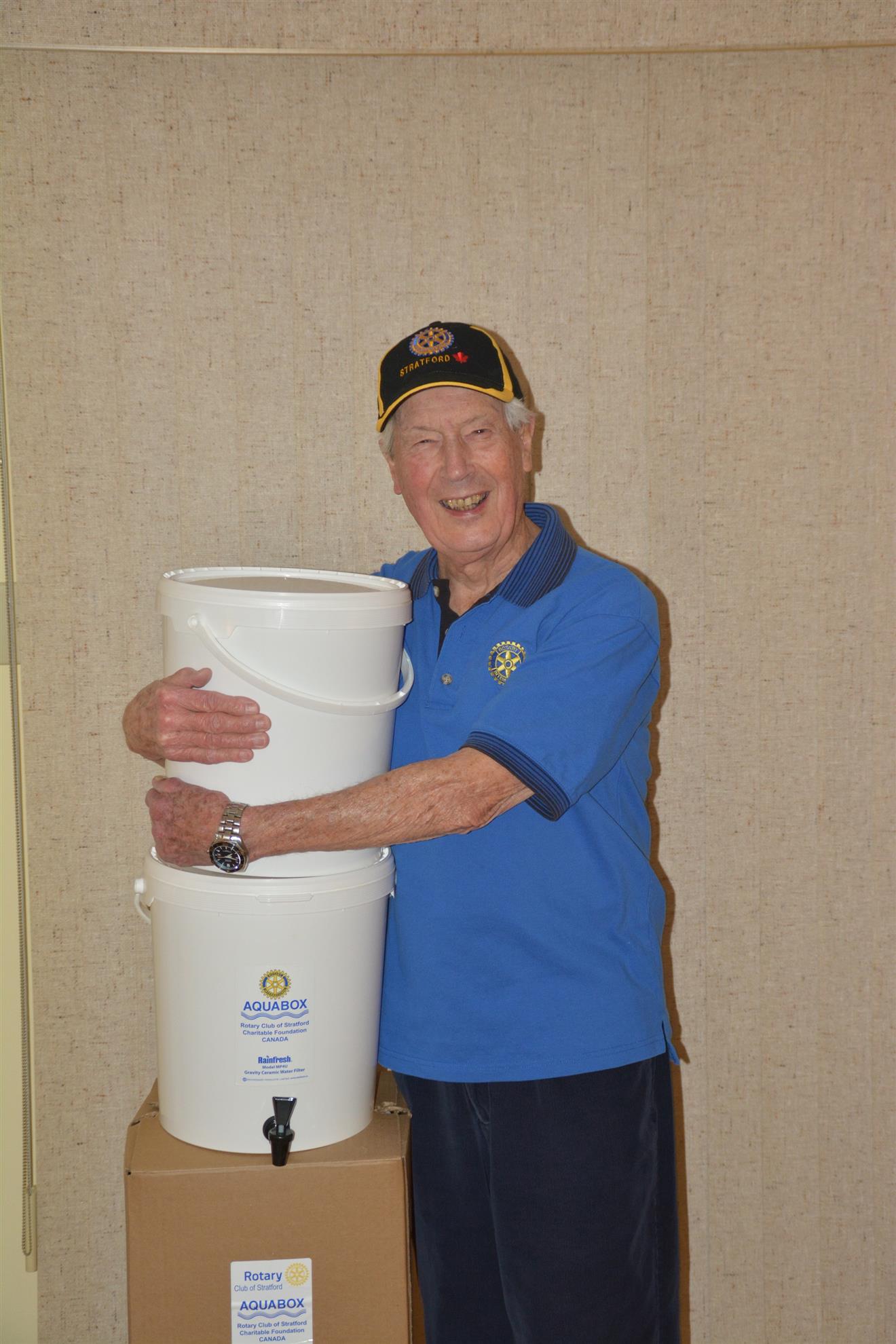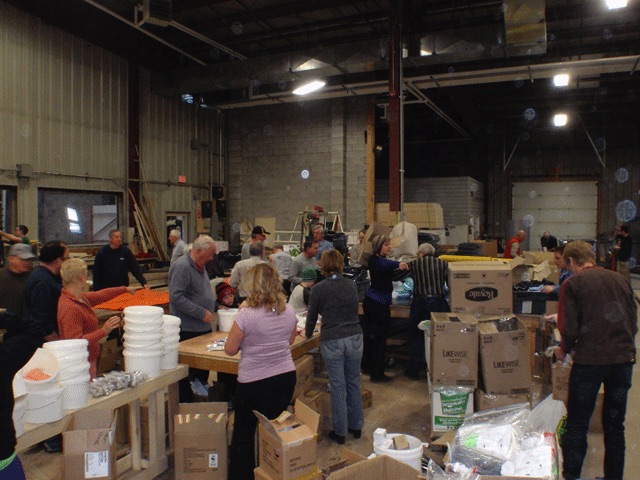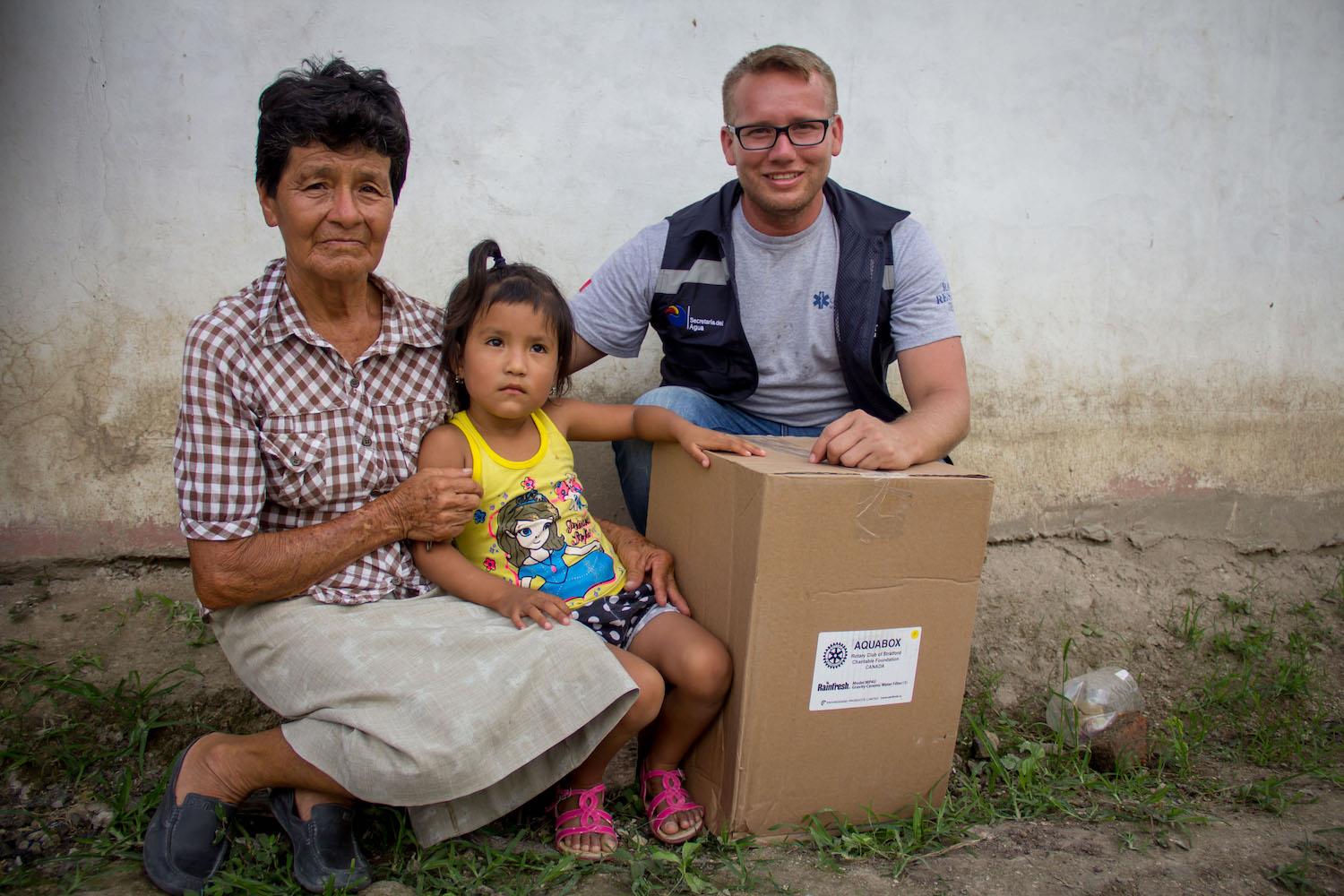 Rotary’s clean water project crosses continents
Rotary’s clean water project crosses continents
Stratford club changing lives one litre at a time
(By Diane Sewell - The Rotary Club of Stratford)
What do you get when you mix two distant Rotarians, some single malt scotch and a friendly conversation on a South Pacific cruise?
A twist of fate that brings millions more litres of safe drinking water to people in crisis, that’s what.
It was roughly 14 years ago that Jim Scott, a member of the Rotary Club of Stratford, bumped into a fellow ship-going Rotarian from Sussex, England who told him about a project called Aquabox. “We were sipping away and discussing how our respective clubs made money and what we did with it,” says Scott. “So this fellow says to me, ‘there’s a club not far from us in Wirksworth and they do this Aquabox thing’. He told me what it was and I thought it was a pretty cool idea. It seemed like a straightforward thing to do – and badly needed.”
Badly needed indeed. The World Health Organization estimates more than half-a-million people die every year due to contaminated drinking water.
In a nutshell, Aquabox provides safe, clean water, through the use of small refillable filtration units, to crisis zones around the world. Since 1992, the Wirksworth club has distributed over 110,000 of them to hundreds of thousands of people in more than 50 countries.
After the cruise, Scott brought the idea home and pitched it to his own club back in Stratford and it too jumped on the bandwagon. Since their first shipment of Aquaboxes to Peru after the 2006 earthquake, the Rotary Club of Stratford, through its Charitable Foundation, has distributed more than 9,600 Aquaboxes to 17 countries, along the way relying on club members’ expertise to refine the product and reduce its cost.
The Stratford Aquaboxes provide potable water for a family of five for up to a year. The filter system traps 99.9% of harmful bacteria, delivering more than 6,000 litres of clean water. A basic hygiene kit, consisting of soap, toothbrush and toothpaste, is also packed in each unit.
 The process of developing the Stratford units and sourcing materials has been a process. The first boxes cost the club $135 each. Now, they cost less than $50. Originally, some parts were made abroad and finding the least expensive, most effective parts was a challenge, but one the club managed to overcome. The Stratford club now gets its filters from a company in Richmond Hill, its buckets from Goderich and the cardboard boxes they’re shipped in from nearby St. Marys.
The process of developing the Stratford units and sourcing materials has been a process. The first boxes cost the club $135 each. Now, they cost less than $50. Originally, some parts were made abroad and finding the least expensive, most effective parts was a challenge, but one the club managed to overcome. The Stratford club now gets its filters from a company in Richmond Hill, its buckets from Goderich and the cardboard boxes they’re shipped in from nearby St. Marys.“Any changes we could introduce to make them safer and easier to use, and cost less to make – that’s what we’re after,” says Scott.
Global Medic, a humanitarian-aid, non-governmental organization based in Toronto, distributes the Stratford Aquabox kits to disaster areas – and looks after raising the money to get them there, which is a huge bonus.
When a new crisis creates the need for more kits, the Stratford club’s Aquabox Committee organizes ‘a build’, inviting volunteers to come to a big, open Stratford Festival workshop which has been loaned for the day. There, a well-organized assembly line made up of Rotarians, friends and family members puts together roughly 500 Aquabox units in a single morning.
“Jim Scott brought the idea of Aquabox to our club and we’ve been extremely fortunate to have members with both the commitment and the expertise to build it, improve it and keep it growing,” says Walter Bathe, chair of the Stratford Rotary Club’s Aquabox Committee.
It’s the Stratford’s club’s hope that the Aquabox project will be adopted by other Rotary clubs in the district, the country and around the world. Since the availability of clean water in disaster zones can mean the difference between life and death, the need for such projects is crystal clear.
 Aquabox is a sharable, growable venture and perhaps a great example of how to fulfill what Rotary International’s president, Barry Rassin, very early on identified as the need for “every club to think of at least one high-impact service project they can do to change people’s lives (The Rotarian, March 2018 edition).
Aquabox is a sharable, growable venture and perhaps a great example of how to fulfill what Rotary International’s president, Barry Rassin, very early on identified as the need for “every club to think of at least one high-impact service project they can do to change people’s lives (The Rotarian, March 2018 edition).“Rotary always talks about how great its network is,” says Scott. “Well, this is a fantastic opportunity to use it.”
For more information on the Stratford Aquabox or to make a donation,
please contact Walt Bathe at waltbathe101@gmail.com
***
PHOTO CAPTIONS:
Photo credits: Photos courtesy of the Rotary Club of Stratford
It was Stratford Rotarian Jim Scott who brought the Aquabox project to the attention of his club.
Aquabox delivery to Ecuador.
Volunteers at an Aquabox ‘build’ in Stratford.
